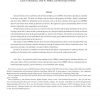Free Online Productivity Tools
i2Speak
i2Symbol
i2OCR
iTex2Img
iWeb2Print
iWeb2Shot
i2Type
iPdf2Split
iPdf2Merge
i2Bopomofo
i2Arabic
i2Style
i2Image
i2PDF
iLatex2Rtf
Sci2ools
110
click to vote
TIT
2010
2010
Asynchronous CDMA systems with random spreading-part I: fundamental limits
Spectral efficiency for asynchronous code division multiple access (CDMA) with random spreading is calculated in the large system limit. We allow for arbitrary chip waveforms and frequency-flat fading. Signal to interference and noise ratios (SINRs) for suboptimal receiver structures, such as the linear minimum mean square error (MMSE) detector and various linear multistage detectors are derived. The approach is general and optionally allows even for statistics obtained by under-sampling the received signal. All performance measures are given as a function of the chip waveform and the delay distribution of the users in the large system limit. It turns out that synchronizing users on a chip level impairs performance for all chip waveforms with bandwidth greater than the Nyquist bandwidth, e.g. positive roll-off factors. The benefits of asynchronism stem from the finding that the excess bandwidth of chip waveforms actually spans additional dimensions in signal space, if the users are de...
| Added | 22 May 2011 |
| Updated | 22 May 2011 |
| Type | Journal |
| Year | 2010 |
| Where | TIT |
| Authors | Laura Cottatellucci, Ralf R. Müller, Mérouane Debbah |
Comments (0)

